Iran-Made Drones Kill At Least Three People In Ukraine
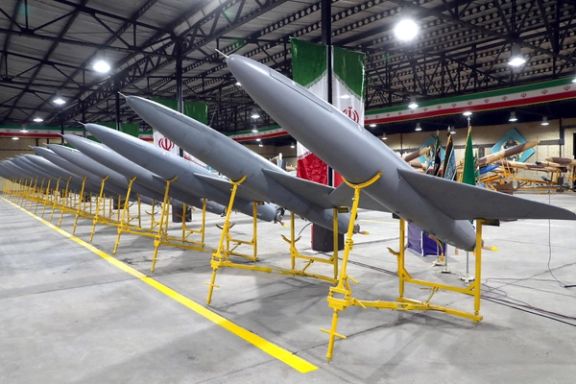
Twenty Iran-made drones attacked Ukraine Saturday night killing at least three people and causing massive destruction.

Twenty Iran-made drones attacked Ukraine Saturday night killing at least three people and causing massive destruction.
Reports on social media say the victims were a woman from Kherson and a married couple from Bakhmut who had fled from their homes hoping to find safety in Odessa.
Meanwhile, the Ukrainian Air Force announced that Iranian-made drones are still a “headache” for Ukraine.
“Iranian-made Shahed kamikaze drones largely used by Russia are still difficult to shoot down,” Air Force spokesperson Yurii Ihnat said in an interview with Ukrainska Pravda on Sunday.
Since last October, Moscow, which launched its full-scale invasion in February last year, has regularly sent waves of Iranian drones to attack targets in Ukraine. Although they are slow, drones are cheaper and more expendable than advanced missiles.
Some experts say that Russia's use of the Shahed drones, costing around $20,000 each, either is meant to confuse Ukrainian air defenses during missile attacks, or to force Kyiv to spend its expensive Western-supplied anti-air missiles.
Iran has denied sending armed drones to Russia after Moscow launched its invasion in February 2022, claiming that any shipments occurred before the war.
However, Russia has used hundreds of Iranian-made drones to attack Ukrainian infrastructure and civilian targets, with Kyiv reporting more supplies in December as Moscow’s stocks were used up.
Western powers have strongly objected to Iran's decision to arm Russia with the Kamikaze drones, and possibly other weapons and ammunition.
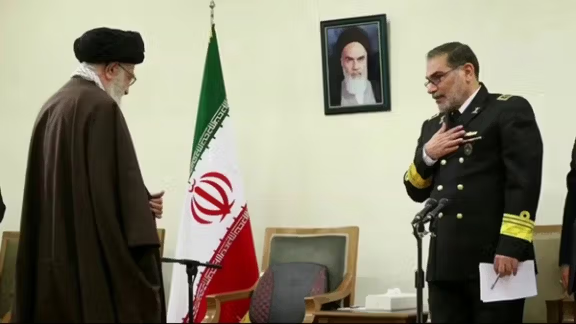
Iran International has obtained information about links between Iran's former security chief Ali Shamkhani and a top drug lord, Naji Sharifi-Zindashti.
According to an Iran International source, Shamkhani was receiving about $3.5 million in bribes per year from Zindashti, in addition to the narcotics that the drug baron personally provided for the secretary of Islamic Republic’s Supreme National Security Council.
Shamkhani’s dealings with Zindashti were among the reasons why a man representing Supreme Leader Ali Khamenei in the security council was pushed out of his position in May.
Sharifi-Zindashti and his accomplices – dubbed “The Friends’ Club” – have used the IRGC’s vast reach and control over transit routes and logistics to gain the upper hand in Iran's drug market, the source said.
The Club is comprised of senior IRGC officials and high-ranking members of Iran’s Supreme National Security Council as well as managers from Tehran Municipality and members of parliament.
Shamkhani, who was a senior member of the "Friends’ Club” was forced out of office, but the drug distribution network is still operating, reportedly trafficking more than 20 percent of narcotics distributed across Iran and about 35 percent of the drugs pushed in the capital Tehran.
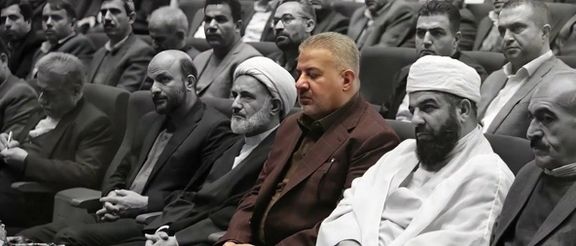
Shamkhani's résumé is so full of controversies that it is difficult to pinpoint a single reason for his removal after about a decade at the post.
In recent months there were rumors about Shamkhani stepping aside as hardliners blamed him for failure to suppress protests. In video-taped remarks released on the internet in November, former lawmaker Hamid Rasaei, a hardliner cleric, accused him of failing to quash protests.
The conjecture was further confirmed after the hacktivist group ‘Uprising till Overthrow -- affiliated with the Albania-based opposition Mojahedin-e-Khalq (MEK) group – hacked into 120 servers at the presidential office, getting access to internal communications, minutes of meetings, President Ebrahims Raisi’s online conference platforms and about 1,300 computers inside the office.
Among the released documents, there is correspondence between the president’s office and the office of Shamkhani, confirming rumors that he stepped down over conflicts with the Raisi administration.
In the letter addressed to Shamkhani, the chief of staff of the president, Gholam-Hossein Esmaili, criticized the security chief for a lack of insight into the wave of protests that engulfed Iran following the death in custody of 22-year-old Mahsa Amini. With a condescending tone, Esmaili rebuked Shamkhani’s office for “merely describing and analyzing the events,” asking him to provide “meta-analyses and predictions” about the developments regarding the protests.
Shamkhani also had a fair share of scandals, like most regime insiders, pertaining to his abuse of power for financial gain and nepotism, including reports about his sons -- Hassan and Hossein -- owning dozens of businesses, such as large shipping companies.
There are also reports about the extravagant lifestyle of his family members in Iran and abroad. Following “rumors” that even his toddler grandson has hundreds of thousands of dollars in just one bank account as well as several properties, authorities announced that the bank account was blocked. Iran International’s investigative journalist Mojtaba Pourmohsen has published several exposés about the corruption of kith and kin, including his nephews Mo’ud and Naji Shamkhani.
Several pundits, such as commentator Morteza Kazemian, are also of the opinion that Shamkhani’s removal may be linked to the case of British-Iranian national Alireza Akbari, a former Iranian deputy defense minister who was executed over charges of spying for Britain. Akbari was a close ally of Shamkhani, and his execution was also interpreted as a move aimed at weakening Shamkhani’s position in the regime.

Iran’s currency has risen by 8 percent since June 5, when reports multiplied about possible secret talks with the US and the news about Iranian funds being freed in Iraq.
The rial on Sunday alone rose nearly 4 percent against the US dollar and other currencies after media reported that the Biden administration gave a waiver to Iraq to release about $2.7 billion of frozen Iranian funds.
The rial was trading at 555.000 against the US dollar on May 1, but on June 11 it rose to 470,000, a 17-percent gain.
Western and Israeli media, as well as Iran International have quoted well-informed sources as saying that direct and indirect talks have been taking place between Washington and Tehran, possibly for a limited nuclear deal or an exchange of Iran’s frozen funds with American dual nationals held hostage by the regime.
South Korean banks hold $7 billion that Seoul owes Tehran for oil imports prior to full US sanctions imposed in May 2019. South Korea was allowed to import a limited quantity of oil from May 2018 to May 2019 despite initial sanctions imposed by the Trump administration.
These funds have been cited as a possible ransom for freeing three US citizens imprisoned in Iran on manufactured charges.
Iraq also owes Iran at least $7 billion, but the $2.7 said to have been waivered by the US will not reach Iran as cash. Tehran can use the money to import food and pay for the expenses of pilgrims going to Iraq.

Food prices are soaring in Iran in the year dubbed by the Supreme Leader as “the year to control inflation.”
The price of mutton has passed 5,000,000 rials a kilogram (about $10) and some other items like edible oil and dairy products have jumped 30 percent in recent weeks.
According to officials, the monthly minimum wage of less than $150 only suffices for nine days of a family's livelihood.
Farmers and ranchers say if they do not increase the prices of meat and dairy products, they have toclose down their businesses soon.
However, Supreme Leader Ali Khamenei claimed Sunday that to resolve the economic woes, the country needs to have nuclear energy, but he declined to say how nuclear energy can help controllingthe inflation.
A few months into the presidency of Ebrahim Raisi, when inflation was around 40 percent, the High Council of Labor increased the minimum wage by an unprecedented 57 percent in early 2022 after two consecutive years of very high inflation. At the time minimum wage almost equaled $220.
However, the rial lost half of its value in the past nine months and the minimum wage, without housing allowance, has dropped to around $120 a month.
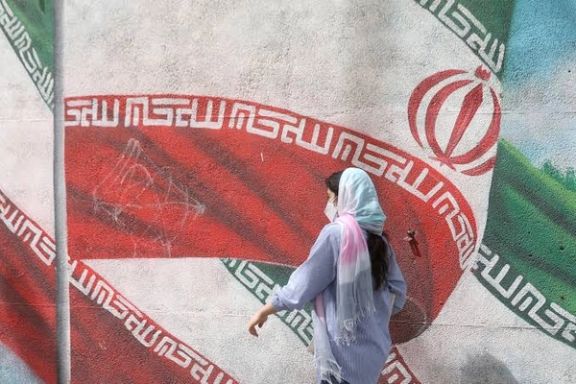
Friday prayer Imams loyal to the Iranian regime have defended government policies in their sermons to intervene in women's lifestyle, especially enforcing hijab.
On the other hand, reformist clerics suggested that the government had better stop putting religious pressure on citizens to “guide them to heaven.”
The Imam in Tehran, Mohamad-Javad Haj-Aliakbari, said that "the enemy" is spreading nihilism in Iran, adding that "In a year when we are getting close to the Majles [parliament] and Assembly of Experts elections, the enemy is trying to sow despair and heresy in Iran."
The term enemy, regularly used by Supreme Leader Ali Khamenei and his loyalists, refers to the United States. By making this statement the Friday Imam was attributing Iranian women's defiance to compulsory hijab to a conspiracy by the United States.
Iranian clerics and regime officials invariably attribute their failures in various cultural, political and economic areas to the United States or the pre-revolution government that was replaced by the Islamic Republic 44 years ago.

The Tehran Imam said the West is waging a cultural onslaught against Iran to stop the country's progress in areas such as missile development. Meanwhile he accused Iranian women of not being chaste enough as they follow the West's teachings.
In another development Ahmad Alamolhoda, the Friday Prayers Imam of Mashad said: "The Islamic revolution's aim was not simply feeding the people and improving the economy. We did not simply want to give political control to the pious and expel US mercenaries from Iran. The aim was to allow the people to live freely."
However, Alamolhoda. a staunch supporter of compulsory hijab and one of the biggest defenders of clerical rule in Iran did not explain how the Islamic Republic or his own ideology would let people live freely. Meanwhile he praised the Islamic Republic's "achievement" in developing a “supersonic missile” that can reach Israel in less than 10 minutes.
Alamolhoda is the father-in-law of President Ebrahim Raisi and enjoys some influence with Khamenei.
As if he was responding to Alamolhoda,Sunni Leader Mawlana Abdolhamid, who led the Friday prayers in Zahedan, said, "Good for you if you can make missiles, but you need to feed the people first." His comment was a reference to Iran's economic crisis that has been pushing millions of Iranians under the poverty line particularly during the past two years.
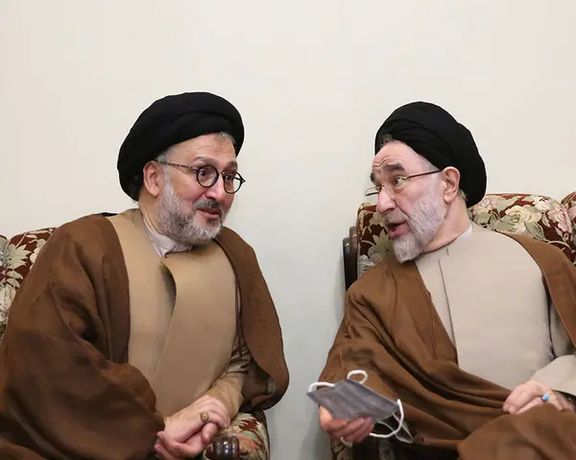
Meanwhile, Iran's former reformist President Mohammad Khatami criticized the government's approach to hijab and hardliner clerics such as Alamolhoda's insults against Iranian women who brand women without hijab as "unchaste." Khatami said: "Hijab and chastity are two different things," adding that hardliner "clerics should not impose the hijab on the Iranian society."
He pointed out that hijab is a matter of choice, and it should not be imposed on women. He suggested that hardliners should avoid imposing "backward" ideas on the society. He added that "Islam should respond to the needs of the modern world." Khatami further stressed that "Women need to be respected if we wish to move toward a better future."
Khatami said: "You should be a human being first and then decide whether you want to be a religious person." He reiterated that there should be no difference between men and women in terms of freedom and dignity and we understand that there will be no limit to our growth."
Meanwhile, Khatami's former chief of staff, Mohammad Ali Abtahi said: "The affairs of the state cannot be furthered by forcing the people and pushing them into paradise, but some of the country's decision-makers believe that this is a good way of running the country and anyone against it should be suppressed." He called on the government to respect the preferred lifestyle of young Iranians.
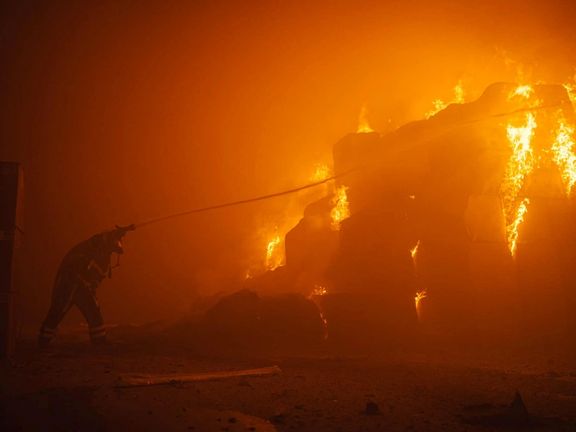
French President Emmanuel Macron warned Iranian counterpart Ebrahim Raisi on Saturday about the consequences of delivering drones to Russia, Macron's office announced.
In a phone call, Macron urged Iran to "immediately cease" the support it is giving Russia in the war against Ukraine.
Iran has supplied hundreds of its kamikaze Shahed drones to Russia that have been used against military and civilian targets since October last year. The United States and its main NATO allies have repeatedly warned Tehran to stop its close military cooperation with Moscow.
Macron also expressed concerns about the trajectory of the Iranian nuclear program, the statement said.
Britain, France, Germany, the United States and Ukraine say the supply of Iranian-made drones to Russia violates a 2015 UN Security Council resolution enshrining the Iran nuclear deal.
Washington has also said that the resumption of nuclear talks with Tehran that can lead to lifting of economic sanctions partly depends on Iran seizing its weapons supplies to Russia.
The White House said on Friday that Russia appeared to be deepening its defense cooperation with Iran and had received hundreds of one-way attack drones that it is using to strike Ukraine.
The drones serve to supplement Russia’s missile inventory that has been reduced as it attacked civilian infrastructure for months. The cheap drones also are a weapon that can exhaust Ukraine’s air defense missiles, as they are often launched in dozens.
With reporting by Reuters